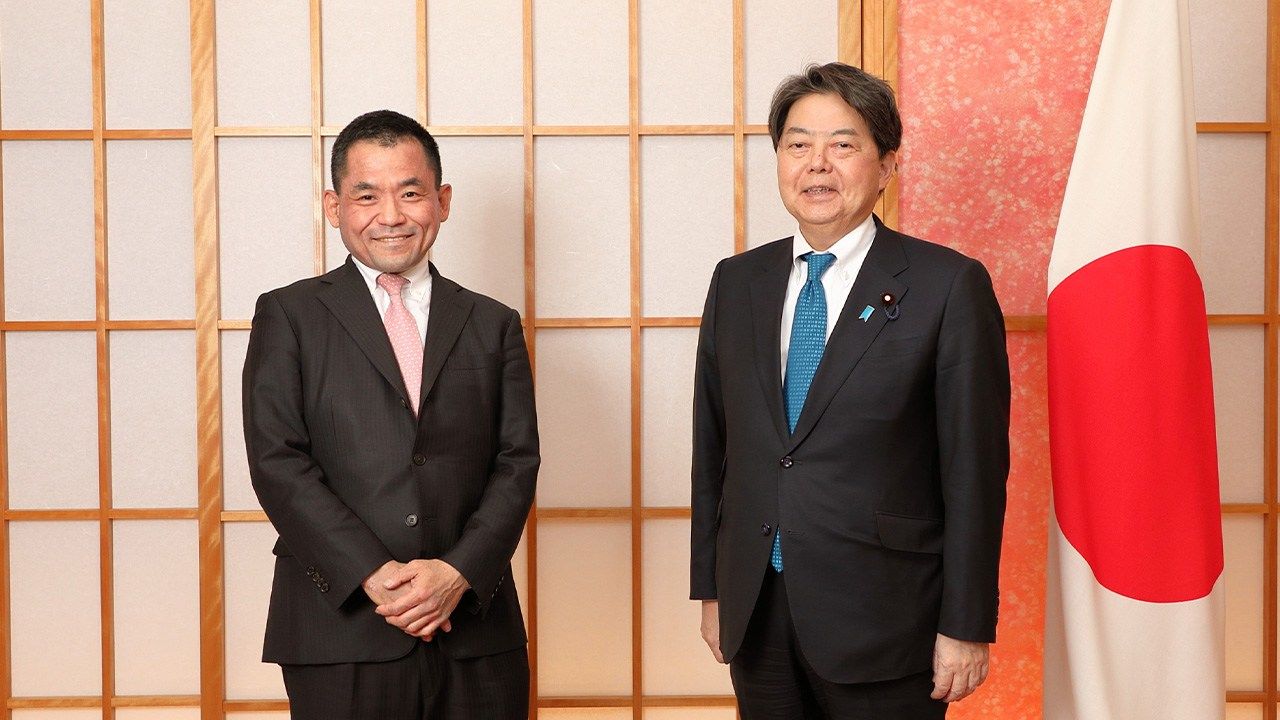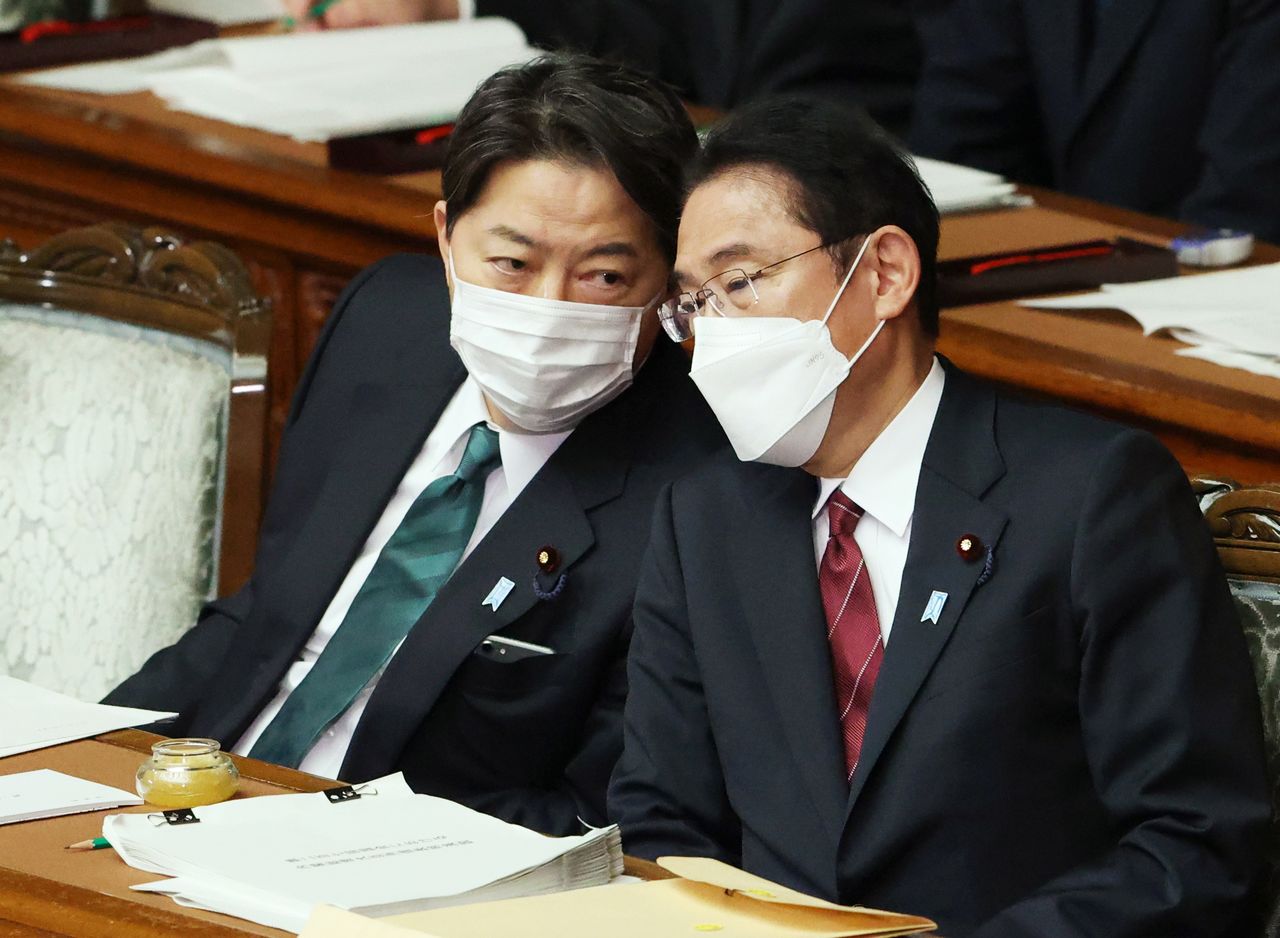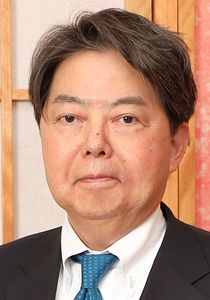
Lessons and Challenges for the Kishida Cabinet
Japan’s Foreign Minister on Furthering Quad Cooperation and Realizing a Free and Open Indo-Pacific
Politics- English
- 日本語
- 简体字
- 繁體字
- Français
- Español
- العربية
- Русский
Strengthening Regional Connectivity with Infrastructure
TAKENAKA HARUKATA Japan’s contributions to realizing a “Free and Open Indo-Pacific” are a good example of it moving beyond its “junior partner” role in the US-Japan alliance. The FOIP vision comprises two policy pillars: economic and security engagement. Japan has contributed to enhanced connectivity through its ongoing involvement in projects like the East-West Economic Corridor and the Southern Economic Corridor in the Mekong subregion, the Delhi-Mumbai Industrial Corridor, and the export of Shinkansen technology to India. Will the Japanese government remain committed to these projects?
HAYASHI YOSHIMASA With respect to Japan’s efforts to realize a Free and Open Indo-Pacific, or FOIP, we will actively continue to work on enhancing connectivity, including by supporting infrastructure development, and on strengthening maritime law-enforcement capability. We attach great importance to quality infrastructure that is resilient, inclusive, and sustainable. Our efforts so far have been highly valued by both the countries we target for assistance and the international community.
In November 2020, the Japanese government announced the Japan-ASEAN Connectivity Initiative to strengthen ASEAN connectivity. This will support the deployment of quality infrastructure while also enhancing ASEAN’s human resource base, which is critical for managing this infrastructure. In December 2021, Japan, together with the United States and Australia, announced cooperative support for the East Micronesia Cable Project, which will connect the Federated States of Micronesia, Nauru, and Kiribati. These are just two examples of our ongoing support; we’ll continue such efforts for quality infrastructure development that contributes to realizing FOIP.
TAKENAKA On the topic of security cooperation, Japan recently signed the Japan-Australia Reciprocal Access Agreement, or RAA. How will the government deepen relations with Australia and other important partners like India, in connection with its bilateral alliance with the United States?
HAYASHI Both India and Australia share with Japan the same basic values including freedom, democracy, and the rule of law, and strategic interests. They are our valued partners in our work to realize FOIP, including at the summit and foreign minister levels. On the security front, we have engaged India through a “2+2” dialogue format, bringing together foreign and defense ministers from each side. We are also conducting joint maritime exercises with the Indian Navy.
Japan is already engaged in 2+2 dialogue with Australia, and meetings have taken place nine times so far. Meanwhile, the Japan-Australia RAA signed on January 6 will make it easier for Japan’s Self-Defense Forces and the Australian Defence Force to conduct cooperative activities while visiting the other country. This will improve our ability to conduct joint training and disaster relief activities, and it’s Japan’s first such agreement with a bilateral partner. We’re also eager to work with Australia on economic security as well as to deepen cooperation in the so-called new security domains of outer and cyber space. I believe this Australia-Japan security cooperation framework will become the template for Japan’s future cooperation with other partners.
TAKENAKA The Quad is another dialogue platform that contributes to the realization of FOIP. A very important leaders’ summit was held face-to-face last year in Washington DC between the four Quad countries of Japan, the United States, Australia, and India. How do you see the Quad framework developing in the future?
HAYASHI I will continue to actively advance cooperation among the Quad members. As soon as Prime Minister Kishida Fumio took office, he held telephone discussions with the leaders of the United States, Australia, and India to confirm their continued commitment to enhanced cooperation among the four countries, and agreed to annual summit and foreign ministerial meetings. I hope to promote cooperation in practical areas like vaccine deployment and distribution, infrastructure development, and emerging technology domains.
The Taiwan Strait’s Significance for US-Japan Relations
TAKENAKA In discussions at last year’s US-Japan foreign ministers’ and leaders’ meetings, both sides emphasized the importance of the “peace and stability of the Taiwan Strait.” What was the reasoning behind raising this topic, especially as it applies to Sino-Japanese relations?
HAYASHI While China and Taiwan have deep ties, especially in the economic field, the overall military balance is tilting to China’s favor. We are closely following recent developments with great interest. There is also heightened awareness across the international community about the importance of the peace and stability of the Taiwan Strait. I raised this issue directly with State Councilor Wang Yi during our foreign ministers’ telephone call last November. We will continue to follow the situation closely and assert our position to the international community, including on both sides of the Taiwan Strait.
TAKENAKA Turning to maritime security issues, how do you view current tensions in the East China Sea given the presence of Chinese governmental vessels and their frequent incursions into territorial waters around the Senkaku Islands? And what about the current situation in the South China Sea, where accelerated land reclamation has resulted in the construction of three new military airfields?
HAYASHI It is unacceptable that China Coast Guard vessels have repeatedly intruded into the Japanese territorial sea around the Senkaku Islands and have attempted to approach Japanese fishing boats. The activities of the China Coast Guard vessels are in violation of international law. In our telephone talk last November, I explicitly expressed Japan’s concerns to State Councilor Wang. With the determination to defend our territory, as well as our territorial sea and airspace, we will continue to take a calm and resolute approach to the situation, while firmly maintaining and asserting our position.
We are also carefully watching the South China Sea, including its militarization. The South China Sea issue is directly connected to regional peace and stability. It’s a legitimate concern for Japan, and indeed for the whole international community, and we strongly oppose any acts to escalate tensions. The Japanese government has consistently called for adherence to the rule of law at sea. I would emphasize the importance of all parties to the South China Sea dispute working toward a peaceful resolution of disputes based on international law.

Prime Minister Kishida Fumio (right) and Foreign Minister Hayashi Yoshimasa, in discussion at the House of Representatives plenary session on December 6, 2021. (© Jiji)
The Future Direction of the CPTPP
TAKENAKA Last September, China suddenly applied for membership in the CPTPP—the Comprehensive and Progressive Agreement for Trans-Pacific Partnership—just ahead of Taiwan’s prospective application. How will you deal with this difficult issue? How is Britain’s accession currently being handled? Furthermore, given recent reports about South Korea preparing an application, and the potential interest of Israel, Colombia, and other OECD nations, are there plans to accept other countries into the CPTPP?
HAYASHI The CPTPP is a very high-standard agreement in terms of not only market access, but also rules including electronic commerce, intellectual property, government procurement, sanitary and phytosanitary measures and others. Opinions vary about China’s trade practices, and we’ll examine whether China is prepared to fully meet the high standards. The same goes for Taiwan. We have a close economic relationship with Taiwan, an extremely important partner that shares fundamental values with Japan. Also, Taiwan has publicly taken measures to submit its application to accede to the CPTPP; Japan welcomes Taiwan’s application.
We need to discuss these accession requests with other members. In addition, the Japanese government will also take into account strategic considerations and public sentiment when making decisions on new accessions.
In June last year the CPTPP Commission agreed to initiate the accession process for the UK. Discussions are currently continuing in the Accession Working Group, which is chaired by Japan. We will ensure that the high standards are maintained as we work to fulfill our responsibility as the chair. We’re therefore paying close attention to those economies that have expressed interest in acceding. However, for the time being we’re focused on Britain’s accession process.
Japan’s Human Rights Diplomacy
TAKENAKA Finally, I’d like to ask you about the Kishida administration’s emphasis on “diplomacy that respects human rights.” Many countries have recently begun to place greater foreign policy emphasis on human rights. During past summit and foreign minister meetings you’ve expressed concern about the human rights situation in the Xinjiang Uyghur Autonomous Region. The prime minister also appointed Nakatani Gen to be his special assistant for the promotion of human rights, while the Foreign Ministry announced that it will create a new human-rights-related post. Does this mean the Japanese government places greater emphasis on human rights and liberal values in its diplomacy compared to the past? If so, will this change how Japan deals with Myanmar and other authoritarian regimes in Asia?
HAYASHI One of the three pillars of the Kishida administration’s diplomacy is the “determination to fully defend universal values.” Human rights are obviously included in our conception of universal values. The appointment of a special assistant to the prime minister for human rights is part of our ongoing efforts to uphold these values.
We are not, however, promoting human-rights diplomacy simply because these issues are drawing increasing attention around the world. Human-rights-focused diplomacy is not a new idea. We have long believed that the protection of human rights is a fundamental responsibility of all countries. We will continue to firmly raise our voices against serious human rights violations, both in bilateral settings and within the international community.
Our efforts are underpinned by dialogue and cooperation. For those countries that are working hard toward democratization and human-rights protection, the Japanese government will encourage their efforts through bilateral dialogue and cooperation. The Japanese government will therefore continue to advance human-rights diplomacy that is unique to our country.
(Originally written in Japanese by Ishii Masato of the Nippon.com editorial department based on a January 19, 2022, interview. Banner photo: Takenaka Harukata, at left, and Foreign Minister Hayashi Yoshimasa in Kasumigaseki, Tokyo. © Hanai Tomoko).
LDP diplomacy Foreign Affairs Kishida Fumio Hayashi Yoshimasa
